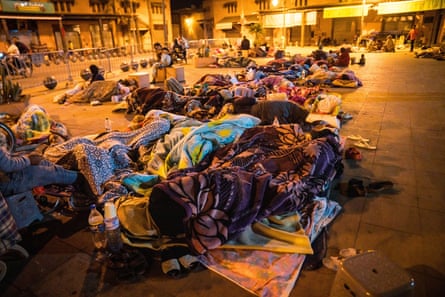Foreign aid and rescue teams were joining the effort to find survivors amid the rubble of destroyed villages in Morocco’s Atlas mountains on Monday, three days after the country’s strongest-ever earthquake.
Friday’s 6.8-magnitude quake, Morocco’s deadliest in more than six decades, had an epicentre below a remote cluster of mountainous villages 45 miles south of Marrakech, and shook infrastructure as far away as the country’s northern coast.
The government reported that at least 2,122 people were killed and more than 2,421 injured, many of them critically. In Marrakech, many people slept outside on pavements and in squares, fearing returning to their homes.
The quake was the deadliest in Morocco since a 1960 earthquake destroyed Agadir, killing more than 12,000 people.
Spain has sent 86 rescuers and eight search dogs to Morocco to “help in the search and rescue of survivors of the devastating earthquake suffered in our neighbouring country”, the defence ministry said in a statement.
“We will send whatever is needed because everyone knows that these first hours are key, especially if there are people buried under rubble,” Spanish defence minister Margarita Robles told public television.

A Qatari aid flight left from Al-Udeid airbase outside Doha on Sunday evening, an AFP journalist said.
Morocco said on Sunday it had accepted aid offers from four foreign nations, while many other countries have also said they were willing to send assistance.
Authorities have responded favourably “at this stage” to offers from Spain, Britain, Qatar and the United Arab Emirates “to send search and rescue teams”, the interior ministry said.
It noted the foreign teams were in contact with Moroccan authorities to coordinate efforts, and said only four offers had been accepted because “a lack of coordination could be counterproductive”.
Other offers may be accepted in the future “if the needs evolve”, according to the ministry. France was willing to provide aid “the second” Morocco requested it, President Emmanuel Macron said.
Morocco’s King Mohammed VI chaired an emergency disaster response meeting on Saturday afternoon and has declared three days of national mourning. Civil protection units were deployed to increase stocks in blood banks and ensure the supply of resources including water, food, tents and blankets to affected areas, the palace said.
The earthquake wiped out entire villages in the hills of the Atlas mountain range, where civilian rescuers and members of Morocco’s armed forces have searched for survivors and the bodies of the dead.
Many houses in remote mountain villages were built from mud bricks.

The remote village of Tafeghaghte, 60km (40 miles) from Marrakech in Al-Haouz province, was almost entirely destroyed, an AFP team reported, with very few buildings still standing. Authorities recorded more than 1,300 deaths in Al-Haouz province alone. Zahra Benbrik, 62, said she had lost 18 relatives. “Everyone is gone. My heart is broken. I am inconsolable,” she said.
According to Moroccan public television, more than 18,000 families have been “affected” by the quake in Al-Haouz, site of its epicentre.
Omar Bajjou, from a village near Asni at the foot of the Atlas mountains, 30 miles south of Marrakech, said the force of the earthquake threw him out of bed, terrifying him and his wife.
“I initially thought it was an airplane that had somehow fallen on the roof of our building,” he said. Fleeing outside, they found chaos in their village. “All of the surrounding houses, especially the mud-brick ones, had crumbled, and the others had huge cracks in them, fatal cracks, like they could collapse at any moment. There was dust everywhere, and the sound of screams,” he said.
Bajjou and the other villagers began to try to dig their neighbours out from under their homes. “We managed to rescue several people who were buried under the rubble, we saved some but others were already dead, like my neighbour. Another lost both of their children, and his wife was injured. In total, there were five dead from our building.”
Morocco has regularly experienced earthquakes along its northern coastline, notably a 6.3-magnitude quake near the town of Al Hoceima in 2004, which killed more than 600 people.
The education ministry announced that classes in the worst-hit villages of Al-Haouz were suspended, and schools would not be open from Monday.
Citizens on Sunday taken to hospitals in Marrakech to donate blood to help the injured while many mobilised to help those affected.
Some parts of Marrakech’s historic medina and its network of alleyways saw significant damage, with mounds of rubble and crumpled buildings.
The Red Cross warned it could take years to repair the damage caused by the quake.
“It won’t be a matter of a week or two … We are counting on a response that will take months, if not years,” said Hossam Elsharkawi, its Middle East and north Africa director.
Additional reporting by Ruth Michaelson
https://news.google.com/rss/articles/CBMif2h0dHBzOi8vd3d3LnRoZWd1YXJkaWFuLmNvbS93b3JsZC8yMDIzL3NlcC8xMS9tb3JvY2NvLWVhcnRocXVha2UtZm9yZWlnbi1yZXNjdWVycy1oZWFkLWZvci1xdWFrZS16b25lLWluLXJhY2UtdG8tZmluZC1zdXJ2aXZvcnPSAX9odHRwczovL2FtcC50aGVndWFyZGlhbi5jb20vd29ybGQvMjAyMy9zZXAvMTEvbW9yb2Njby1lYXJ0aHF1YWtlLWZvcmVpZ24tcmVzY3VlcnMtaGVhZC1mb3ItcXVha2Utem9uZS1pbi1yYWNlLXRvLWZpbmQtc3Vydml2b3Jz?oc=5
2023-09-11 06:59:00Z
2417420500
Tidak ada komentar:
Posting Komentar